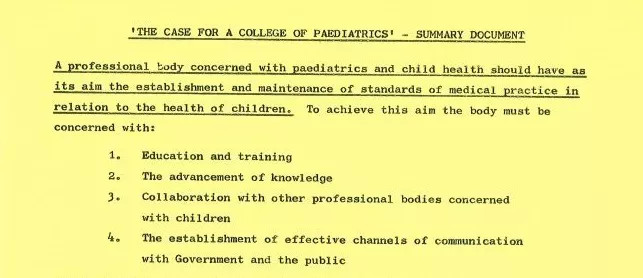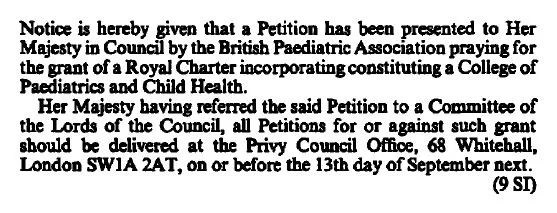
The BPA was formed in 1928 to advance the study of paediatrics and promote friendship among paediatricians. Education and training of doctors fell with the three Royal Colleges of Physicians of the UK. For much of the BPA’s existence there was discussion of change, although disagreement on what form this should take.
In April 1943, Donald Paterson, BPA Honorary Secretary, wrote to solicitors to enquire about the necessary steps to develop the BPA into a ‘College of Child Health’. He discovered it would take about a year, cost around £250 (almost £10,000 in 2024) and that the Second World War would not prohibit matters.
Four years later, Paterson wrote to Alan Moncrieff, his successor, stating 'No suggestion will come from me that we break off our become a College or Academy ourselves, at the moment; that I feel is for the future’ – though he did suggest a sub-committee should examine the matter.
It became a large topic of discussion in the 1970s. In 1972, Bernard Laurence, BPA Honorary Secretary, responded to an enquiry, ‘We are certainly pursuing the idea of a Faculty of the RCP but... no decision is going to be made in a hurry. It will be one or two years before we come to a conclusion’.
By 1976 the Executive Committee had concluded that the BPA should become either a Faculty or a College with a view to obtaining greater authority in promoting child health, controlling paediatric training and achieving better representation.
A year later Council was discussing a paper on The Case for a College of Paediatrics. Members were encouraged to express their views, regional meetings were held and in 1978 a referendum happened. Members were asked to vote yes or no to the question, ‘Do you wish the Association to proceed towards the promotion of a College of Paediatrics?’ 624 of a possible 878 members voted – 141 said yes, 483 said no.

A Joint Paediatric Committee was established after the vote, comprising the three Royal Colleges and the BPA. It had some early success in obtaining representation for paediatrics. The BPA Council decided to give it a chance to establish and a five years moratorium was imposed on further discussion on the subject of a College.
The discussion was of course not over though. In 1986, a green paper on The Future of the British Paediatric Association discussed the options and concluded that ‘the current position of the Association as a voice of Child Health in this country is no longer acceptable and some form of evolution is now indicated’.
Another referendum in September 1987 provided more options and led to a far more ambiguous result:
| Option | First preference |
|---|---|
| Faculty of RCPs | 450 |
| Independent college | 489 |
| Status quo | 71 |
Excluding the lowest option and transferring second preference, the position became:
| Option | Second preference transferred |
|---|---|
| Faculty of RCPs | 489 |
| Independent college | 506 |
| No further preference | 6 |
The vote for an independent College won by less than 2%. Such a slim majority was to cause further dispute.
A sub-committee was set up to study the results of the referendum and propose solutions. The committee proposed to establish a College of Paediatrics interdependent with the three RCPs.
Negotiations with the RCPs commenced, leading to a series of proposals put to another referendum in 1990. This asked if there should be closer integration with the RCPs but continued independence to speak on behalf of paediatrics and child health. 469 voted yes and 745 voted no.
This was perhaps a signal that paediatricians were ready to commit to change. More than half of the BPA’s members had joined in the past 10 years and training had changed dramatically during that time, with there now being a paediatric MRCP exam.
Another referendum was held in 1992. This time the question asked was ‘Do you wish the BPA to proceed to apply for a Charter to become a College?’ 1267 ballots returned – 62% in favour, 38% against. The results were accepted as a mandate for change and Honorary Officers were instructed to seek a Charter to become a College.
A draft Petition, Bye-Laws and Charter were formally lodged with the Privy Council in February 1994. Two months later, members voted at the AGM in Warwick in favour of empowering Council to 'take all necessary steps to petition the Queen’s most Excellent Majesty and Council'.

Negotiations with the Privy Council and Department of Health began, although it was still not entirely smooth sailing, as support from other Colleges and medical organisations was not universal.
Letters of support were received from some colleges such as the Royal College of General Practitioners and Royal College of Obstetrics and Gynaecology, but in Winter 1994 the London RCP President formally opposed the petition. Many BPA members were fellows of the RCP, so this caused some discord.
The BPA’s lobbying continued and in January 1996 the decision was made. A letter arrived stating, 'The Privy Council, having considered the Petition, are minded, without prejudice, to recommend to Her Majesty that a Charter be granted'. The news arrived during a meeting of the Academic Board and champagne duly followed.
The Charter was granted on 23 July 1996 and was received by the College on 23 August 1996.

The initial charter was for a College of Paediatrics and Child Health, as the appellation 'Royal' was a separate matter, granted via recommendation of the Home Office. It had been agreed that the College could use 'Royal' from the start, but due to Government administrative problems it was delayed until 18 October 1996. Finally, the long road to becoming a Royal College was complete and the next journey could begin.
Our charter can be viewed in the Members' Room at our offices in London.
You can find more information about the history of RCPCH. Our archives contain records of our history as the British Paediatric Association (BPA) and a Royal College, and of the history of child health. If you would like to access the archives, or you would like more information about our history and archives, please contact us on information.governance@rcpch.ac.uk.









